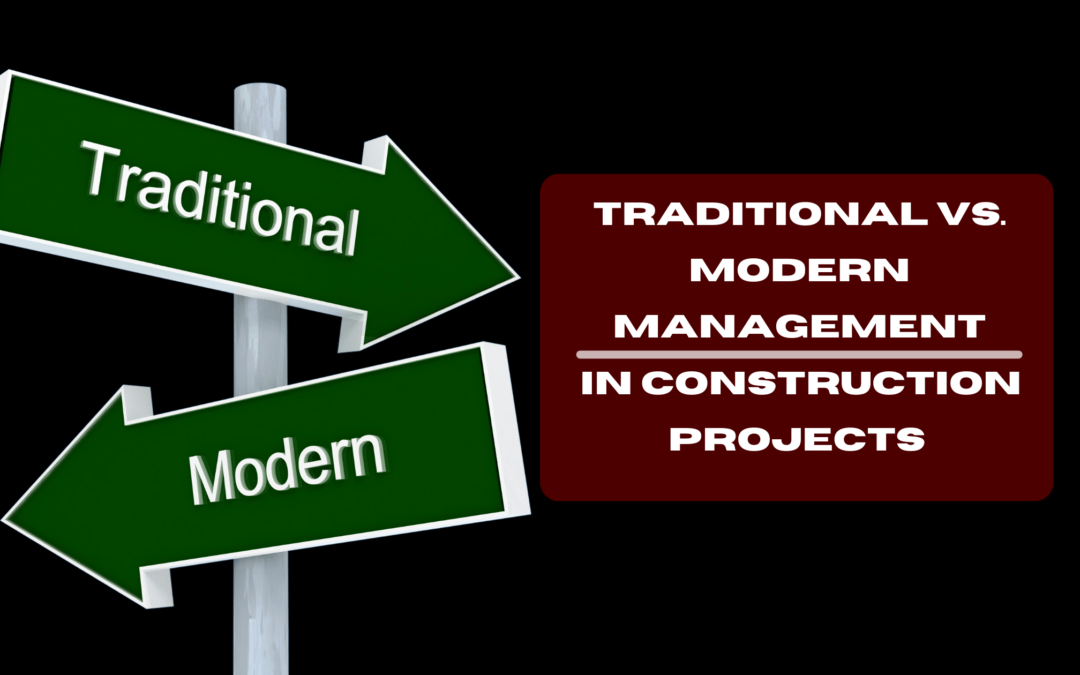Traditional vs. Modern Management in Construction Projects: Approaches
In the intricate world of construction project management, the approach to managing projects has evolved significantly over time. Traditional management practices that once dominated the industry are now being challenged by modern approaches that emphasize flexibility, collaboration, and innovation. In this comprehensive exploration, we will compare traditional and modern management approaches in construction projects to understand their characteristics, methodologies, and implications for the industry.
Table of Contents
Traditional Management:
Characteristics:
- Traditional management in construction projects relies on a hierarchical structure with well-defined roles and responsibilities. This hierarchical pyramid delineates authority and control.
- Decision-making typically follows a top-down approach, with senior management holding the decision-making power, and there is limited room for adaptability.
Methodology:
- Projects are often organized into sequential phases, resembling the “waterfall” model, where each phase must be completed before the next one begins. This sequential approach can provide clarity but may lack agility.
- Extensive documentation, including detailed project plans and specifications, is a hallmark of traditional management. These documents serve as roadmaps for the entire project lifecycle, offering a clear and structured path.
Communication:
- Formal communication channels are emphasized, with regular progress reports, structured meetings, and a well-defined hierarchy for information flow.
- Decision-making authority is centralized, typically resting with senior management. This centralized decision-making can ensure consistency but may slow down responsiveness.
Pros:
- Well-established processes and procedures provide a sense of reliability and predictability. This structured approach is comforting, particularly in large and complex projects.
- Clear accountability and well-defined roles help prevent confusion and ambiguity, ensuring that everyone knows their responsibilities.
- Traditional management practices are often well-suited for projects with established processes and minimal uncertainties.
Cons:
- Limited adaptability to unexpected changes or project complexities can lead to delays and cost overruns. The rigid structure may struggle to accommodate dynamic conditions.
- The hierarchical decision-making structure may result in slower responses to critical issues, impacting project progress.
- Innovation and creativity may be stifled in favor of adherence to established processes, potentially missing opportunities for improvement.
Modern Management Approaches:
Characteristics:
- Modern management approaches in construction projects prioritize flexibility and adaptability. They recognize the need for a more dynamic and agile approach.
- Collaboration, open communication, and empowerment of project teams are central to this approach. It values the input and creativity of all team members.
Methodology:
- Agile project management principles are often employed, breaking projects into smaller, more manageable phases that allow for iterative development. This approach emphasizes continuous improvement and adaptability.
- Lean construction principles focus on minimizing waste and optimizing processes for efficiency. Efficiency and sustainability are at the core of this methodology.
Communication:
- Open and frequent communication is encouraged among all project stakeholders, breaking down traditional communication silos. Transparency and information sharing are key.
- Decision-making authority is decentralized, enabling project teams to make decisions based on real-time data and feedback. This empowerment enhances responsiveness.
Pros:
- Enhanced adaptability to changing project conditions allows for more agile responses to unforeseen challenges. Modern management thrives in dynamic environments.
- Improved collaboration and communication lead to a better understanding of project goals and objectives, ensuring that everyone is aligned toward success.
- There is greater potential for innovation and continuous improvement in project processes and outcomes, fostering a culture of creativity.
Cons:
- Implementing modern management approaches may require a cultural shift within organizations, which can be challenging. Resistance to change may arise.
- Successful adoption relies on having skilled project teams capable of self-management and decision-making. Not all teams may possess these skills.
- Modern approaches may not be suitable for all project types, particularly those with well-defined scopes and limited uncertainty. They are best suited for complex, dynamic projects.
Implications for Construction Projects:
Traditional Approach:
- Traditional management practices are well-suited for projects with established processes and minimal uncertainties. When the project scope is clear, and there is little risk of significant changes, this approach provides structure and predictability.
- They are effective in situations where a strict hierarchy and clear roles are essential for project success. In large, complex projects, traditional management can offer stability.
Modern Approach:
- Modern management approaches shine in projects with evolving scopes or complex requirements. When the project environment is dynamic, and changes are expected, this approach enables adaptability.
- They encourage collaboration and empower project teams to make decisions that directly benefit the project. In innovative projects where creativity and flexibility are paramount, modern management excels.
Conclusion:
In conclusion, the choice between traditional and modern management approaches in construction projects is not a one-size-fits-all decision. Instead, it should be influenced by the nature of the project, its complexity, and the organizational culture.
As the construction industry evolves and embraces innovation, many professionals are finding that a blend of both approaches may yield the best results. By recognizing the strengths and weaknesses of each method and tailoring their use to specific project requirements, construction project managers can navigate the challenges and opportunities that come their way.
In the end, successful construction project management is about being adaptable, understanding the unique demands of each project, and leveraging the right management approach to achieve success.
“In the construction industry, adaptability and innovation are key drivers of success. The ability to evolve and embrace modern management practices can make all the difference.”
So whether you find yourself following a traditional path or exploring the modern landscape of construction project management, remember that the goal remains the same: to build and create in ways that benefit both your organization and the industry as a whole.

